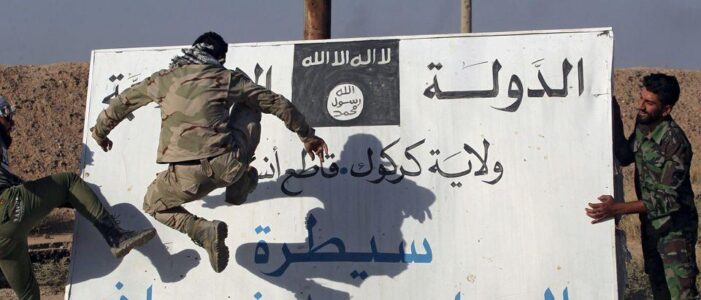
The Islamic State is back but its focus has shifted
The Islamic State is festering globally as its base of operations shifts to Africa, where poor local control offers space for the violent jihadists to regroup and revitalize, according to experts.
Islamic State groups have proliferated throughout the Middle East, central Asia and Africa even after a U.S.-led global coalition dealt the core group, the Islamic State in Iraq and Syria (ISIS), a territorial defeat in 2016, experts told the Daily Caller News Foundation. While so far the groups have adopted a locally-focused strategy of survival in some areas and rebuilding in others, the U.S. remains engaged in countering the revitalized terrorist threat.
“ISIS has regrouped … and it is organizing for a prolonged insurgency,” a recently-declassified intelligence document stated, forecasting ISIS capabilities through 2021.
The assessment has proven accurate, according to former Deputy Coordinator for Counterterrorism and Vandenberg Advisory Board member Christopher Harnisch. “They laid low for a while, have re-grouped, and are now making a resurgence in the region,” he told the DCNF.
ISIS has proliferated far beyond its initial hub in Iraq and Syria. Semi-autonomous affiliates have sprung up in Africa, vying with al-Qaida-linked groups for the speed of their territorial acquisition while weak or sympathetic governments struggle to contain the threat, experts told the DCNF.
In Iraq and Syria, ISIS has gone “underground,” focused on fundraising and recruiting, according to Bill Roggio, a senior fellow at the Foundation for Defense of Democracies.
“They’re looking to step back up … as soon as the U.S. takes our eye off,” Roggio said to the DCNF.
In late August and early September, U.S. Central Command forces and Syrian allies captured dozens of ISIS operatives in the al-Hol refugee camp in northeast Syria and potentially dissolved a “major ISIS facilitation network,” officials told The Washington Post. U.S. Central Command (CENTCOM) has raided the camp seven times since 2021, each time detaining between 40 and 120 ISIS suspects.
The camp, consisting primarily of women and children who are either relatives of ISIS members or fighters themselves, functions as a hotbed for terrorist recruitment and provides cover for illicit financing operations, the Post reported.
“The next generation of ISIS is growing up there,” Simone Ledeen, former deputy assistant secretary of defense for the Middle East, told the DCNF.
Failed states like Iraq, Syria and Afghanistan, provide the perfect “petri dish” for violent jihadist groups to metastasize, Daniel Hoffman, a former CIA official with operational experience in the Middle East, told the DCNF.
The U.S. withdrawal from Afghanistan, during which the Taliban liberated hundreds of imprisoned ISIS fighters, provided a “jolt of momentum” for the jihadi Islamist movement, Harnisch said to the DCNF.
The Islamic State routinely conducts attacks against Taliban targets, claiming a suicide bombing earlier in September at the Russian mission in Kabul that killed two of Moscow’s diplomats, according to The Associated Press.
ISKP poses a “moderate to high threat” to the Taliban and Afghan citizens and could grow, CENTCOM Gen. Kenneth McKenzie told the Senate’s military committee members in a March hearing.
However, Islamic State’s branch in Afghanistan, ISKP, is likely the weakest, mainly because it must fight off a much larger Taliban that has access to state resources and foreign backing, Roggio explained to the DCNF.
ISIS leadership in Africa is much less centralized that al-Qaida’s, leaving the Africa-based affiliates — the Somali Islamic State; Islamic State Central Africa Province (ISCAP) in the Democratic Republic of the Congo; the Islamic State in Mozambique (ISM); the Islamic State Sinai Province (ISSP) in Egypt; the Islamic State in the Greater Sahara (ISGS)/Islamic State Sahel Province in Mali, Niger and Burkina Faso; and the Islamic State West Africa Province (ISWAP) in Nigeria — to pursue more local strategies.
The local agenda affords fundraising, field experience and training, said Ledeen. ISIS groups can “achieve moderate goals and live to fight another day — slowly growing stronger and wealthier.”
Africa is “the central focus of terrorism in the world,” Gen. Stephen J. Townsend said in July before stepping down from his position as head of U.S. Africa Command (AFRICOM) head, adding that the Islamic State has developed financial networks with affiliates across the globe. Engagement in the region looks like sponsoring military exercises with local forces to train them in counterterrorism and counterinsurgency tactics, he said.
The Biden administration’s policy of “integrated deterrence” means it has refocused on “civilian tools” along with training and advising local military partners.
In Africa, the U.S. conducts an “economy of force” mission prioritizing resource efficiency to achieve objectives, Joint Chiefs Chairman Gen. Mark Milley explained in 2020.
“I would say there’s been some progress. There have been some tactical victories,” said Townsend in July of AFRICOM’s progress in countering terrorism. He reiterated the need for a holistic strategy that addresses the root of violent extremism in “poor governance.”
Through the Global Coalition, the U.S. “relies on the active partnership of African nations in a civilian-driven effort led by Africans and leveraging international partner resources,” a spokesperson for the State Department’s Bureau of Counterterrorism said to the DCNF.
Nevertheless, most ISIS groups in Africa continue to strengthen, according to a recent analysis from the American Enterprise Institute.
ISIS has yet to conduct a known coordinated, top-down attack against the U.S. or Western allies, but that doesn’t mean the U.S. is completely out of reach. Some groups have kidnapped Americans traveling in areas near their control. U.S. authorities also arrested an Ohio man with connections to ISIS in May for plotting to assassinate former President George W. Bush.
In the near term — three to five years — “the Islamic State is going to be focused on survival,” Roggio said to the DCNF.
CENTCOM and AFRICOM did not respond to requests for comment.
Source: Daily Caller





